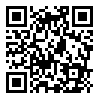Volume 9, Issue 2 (Winter 2022)
IJRN 2022, 9(2): 41-52 |
Back to browse issues page
Download citation:
BibTeX | RIS | EndNote | Medlars | ProCite | Reference Manager | RefWorks
Send citation to:



BibTeX | RIS | EndNote | Medlars | ProCite | Reference Manager | RefWorks
Send citation to:
Maghdoori Z, Mohammadi Shahbalaghi F, Novorzi Tabrizi K, Sadeghi H, Javanshir K, Vahedi M. The effect of using a pain self-management program on self-efficacy and acceptance of pain in the elderlies with chronic back pain: a clinical trial study. IJRN 2022; 9 (2) : 5
URL: http://ijrn.ir/article-1-737-en.html
URL: http://ijrn.ir/article-1-737-en.html
Zahra Maghdoori Mrs. 

 , Farhanaz Mohammadi Shahbalaghi Dr *
, Farhanaz Mohammadi Shahbalaghi Dr * 

 , Kian Novorzi Tabrizi Dr
, Kian Novorzi Tabrizi Dr 

 , Hajer Sadeghi Mrs.
, Hajer Sadeghi Mrs. 
 , Khodabakhsh Javanshir Dr
, Khodabakhsh Javanshir Dr 

 , Mohsen Vahedi Dr
, Mohsen Vahedi Dr 




 , Farhanaz Mohammadi Shahbalaghi Dr *
, Farhanaz Mohammadi Shahbalaghi Dr * 

 , Kian Novorzi Tabrizi Dr
, Kian Novorzi Tabrizi Dr 

 , Hajer Sadeghi Mrs.
, Hajer Sadeghi Mrs. 
 , Khodabakhsh Javanshir Dr
, Khodabakhsh Javanshir Dr 

 , Mohsen Vahedi Dr
, Mohsen Vahedi Dr 


Professor, Department of Nursing, School of Rehabilitation Sciences, University of Social Welfare and Rehabilitation Sciences,Tehran,Iran. mohammadifarahnaz@gmail.com
Abstract: (3595 Views)
Introduction: Chronic back pain is the most common type of musculoskeletal pain and the main cause of disability in the elderly. The self-management training program for chronic back pain control has positive consequences for the elderly and the health system. This research was conducted with the aim of determining the effect of implementing a self-management program on self-efficacy and acceptance of pain in the elderly with chronic back pain who referred to the specialized clinics of Babol University of Medical Sciences in 2021.
Methodology: The present study was a clinical trial of a pre-test-post-test design, applied type. The research sample of 100 elderly people was allocated to two intervention and control groups by means of available sampling and random sequence using variable blocks method. The self-management program included awareness and cognition, problem solving process, stress control, muscle relaxation, and sports exercises. The patients were trained for four weeks and followed up for one month. Data were collected with pain self-efficacy questionnaire and pain acceptance questionnaire before, after and one month after the intervention. The results were analyzed using SPSS version 22 software at a significance level of <0.05.
Results: There was no significant difference in the average self-efficacy and pain acceptance between the intervention and control groups before the intervention, while there was a significant difference between the two groups after the intervention in the average self-efficacy and pain acceptance (P<0.001). Also, the findings indicated that there was a significant improvement in the average self-efficacy and acceptance of pain before and after the implementation of the intervention in the intervention group (P<0.001).
Conclusion: Self-management program training has a positive effect on improving self-efficacy and acceptance of pain in the elderly, so the use of this non-pharmacological and supportive method can be used by nurses as an effective method to control chronic back pain.
Methodology: The present study was a clinical trial of a pre-test-post-test design, applied type. The research sample of 100 elderly people was allocated to two intervention and control groups by means of available sampling and random sequence using variable blocks method. The self-management program included awareness and cognition, problem solving process, stress control, muscle relaxation, and sports exercises. The patients were trained for four weeks and followed up for one month. Data were collected with pain self-efficacy questionnaire and pain acceptance questionnaire before, after and one month after the intervention. The results were analyzed using SPSS version 22 software at a significance level of <0.05.
Results: There was no significant difference in the average self-efficacy and pain acceptance between the intervention and control groups before the intervention, while there was a significant difference between the two groups after the intervention in the average self-efficacy and pain acceptance (P<0.001). Also, the findings indicated that there was a significant improvement in the average self-efficacy and acceptance of pain before and after the implementation of the intervention in the intervention group (P<0.001).
Conclusion: Self-management program training has a positive effect on improving self-efficacy and acceptance of pain in the elderly, so the use of this non-pharmacological and supportive method can be used by nurses as an effective method to control chronic back pain.
Article number: 5
Type of Study: Applicable |
Subject:
Other topics
Received: 2022/08/13 | Accepted: 2022/08/29 | Published: 2023/01/15
Received: 2022/08/13 | Accepted: 2022/08/29 | Published: 2023/01/15
Send email to the article author
| Rights and permissions | |
 |
This work is licensed under a Creative Commons Attribution-NonCommercial 4.0 International License. |


